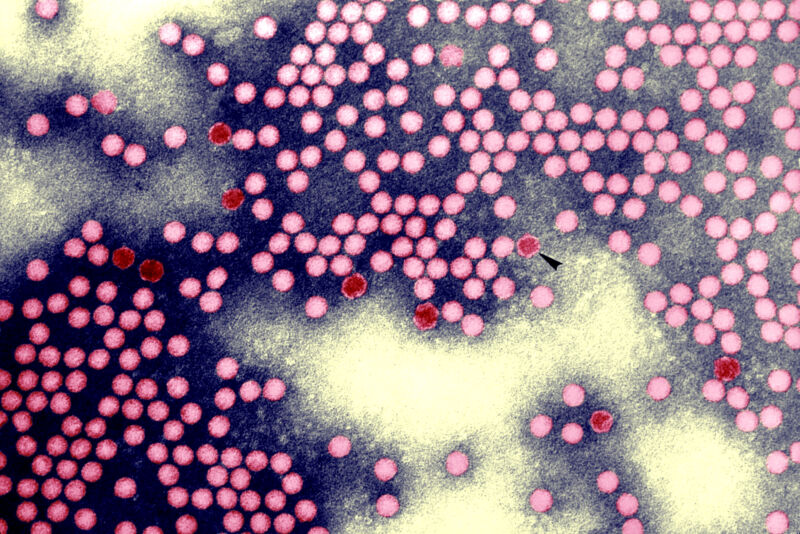
The vaccine-derived poliovirus that left an unvaccinated US resident with the country’s first case of paralytic polio in nearly a decade has been genetically linked to spread in two other countries: the United Kingdom and Israel. Now that it has been detected in the US, health officials fear it has spread to hundreds or even thousands of people in a poorly vaccinated New York county.
On Monday, officials in New York urgently encouraged unvaccinated residents to get vaccinated “as soon as possible” to prevent further spread of the virus.
“Polio is very contagious, and an individual can transmit the virus even if they aren’t sick,” the New York State Department of Health said in a news release today. The virus spreads easily via a fecal-oral route through poor hygiene and sanitation. The virus transmits through direct contact with an infected person or contaminated food or water. “Symptoms, which can be mild and flu-like, can take up to 30 days to appear, during which time an infected individual can be shedding virus to others,” the health department added.
About 1 in 200 people infected with poliovirus develop paralysis, according to the US Centers for Disease Control and Prevention. That means for the one case of paralytic polio to have arisen in New York—which was not linked to any international travel—hundreds of others were likely already infected.
Pockets of risk
Most Americans have been vaccinated against poliovirus, making them safe from the dangerous virus. The three-dose inactivated polio vaccine (IPV), given in the first 24 months with a fourth-dose booster between the ages of 4 and 6, is part of the CDC’s standard immunization schedule. According to CDC data from 2015, nearly 93 percent of US children received their three doses of IPV by the age of 2.
But, the paralytic polio case in New York was found in Rockland County, a northern suburb of New York City, which has pockets of low vaccination rates. In fact, in 2019, the county struggled with an explosive measles outbreak due to the same problem.
According to the state health department, Rockland County currently has a polio vaccination rate of just 60.5 percent among 2-year-olds, compared to the statewide average of 79 percent.
The paralytic case in Rockland, which occurred in an unvaccinated young adult, was first reported by authorities on July 21, but the person’s symptoms began in June. Since then, transmission likely continued, with epidemiologists now saying that thousands could be infected.
Multinational spread
And that’s just in the US. On Friday, the Global Polio Eradication Initiative (GPEI) announced that the strain of vaccine-derived poliovirus behind the Rockland case—a type 2 VDPV—is genetically linked to viruses detected in wastewater sampling in London and Jerusalem, suggesting a sustained, multinational spread of the dangerous virus.
To be clear, vaccine-derived poliovirus strains evolve from oral polio vaccines (OPV), which are no longer used in the US or the UK. (Israel uses both IPV and OPV.) The oral polio vaccines use weakened viruses that, if able to spread from person to person amid poor sanitation and low vaccination rates, can mutate to regain disease-causing capabilities. It’s unclear where and how this VDPV2 originated and spread.
“It is vital that all countries, in particular those with a high volume of travel and contact with polio-affected countries and areas, strengthen surveillance in order to rapidly detect any new virus importation and to facilitate a rapid response,” GPEI said. “Countries, territories, and areas should also maintain uniformly high routine immunization coverage at the district level and at the lowest administrative level to protect children from polio and to minimize the consequences of any new virus being introduced.”
Officials in New York are heeding that call, opening vaccination clinics and urging residents to line up for shots, particularly children.
“Polio is a dangerous disease with potentially devastating consequences,” New York State Health Commissioner Mary Bassett said in a statement. “In the United States, we are so fortunate to have available the crucial protection offered through polio vaccination, which has safeguarded our country and New Yorkers for over 60 years. Given how quickly polio can spread, now is the time for every adult, parent, and guardian to get themselves and their children vaccinated as soon as possible.”









